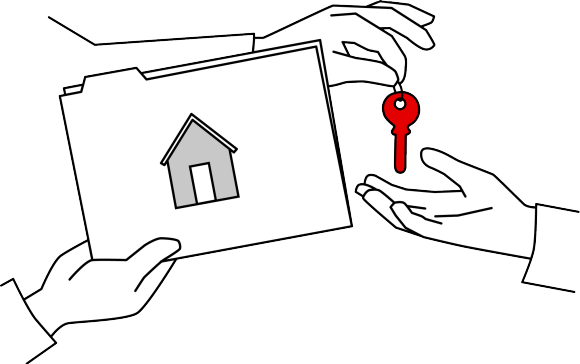We’re here for you
Arrange an appointment for a non-binding consultation or if you have any questions, just give us a call.

![]()
header.search.error
Home ownership
Calculating a realistic market value is crucial for the valuation of a property. Learn about the important factors.
Content:

How much is a house or apartment worth? You will need to answer this question if you want to buy real estate, or at the latest when selling your own property. Since the purchase or sale of real estate generally involves very large sums of money, you should address the subject of real estate valuation early and with care.
What’s more, buyers and sellers sometimes have very different ideas about the market value of a property. That’s why it’s usually advisable to call in a professional to help establish the purchase price.
A real estate valuation is a good reference point for establishing the subsequent purchase or sales price. However, it’s not easy to calculate or estimate the market value of a property because no two properties are the same.
Every property and every plot of land must be considered in its own right. In short, there is no such thing as the right price, and there are no simple price lists you can use to calculate it. The market value is only an estimation.
The market value of a property is defined as the price that should be obtained for the property within twelve months under normal market conditions.
Various factors are taken into account to determine the value of a single-family house or apartment. The location of the property is of vital importance. Buildings in peripheral, poorly connected regions are sometimes worth a lot less than comparable properties in central locations. An apartment in the city center of Geneva or Zurich is therefore worth more than an apartment in the Jura with an equivalent standard of finish and living space.
Other factors that play a role in determining the market value of a property are the surface area or volume, year of construction, number of rooms, standard of finish and condition, as well as the building materials used, which will have an impact on the quality of the property, including its interior fittings. Any restrictive provisions such as building rights or preemptive rights must also be taken into account.
Hedonic/comparative value method: Using statistical methods, a property is divided virtually into its components (location, size, number of rooms, etc.). This makes it possible to determine the average purchase price paid for comparable properties. Banks and calculators available online usually rely on the hedonic method.
Capitalized income value method: The capitalized income value is the rental value attainable for the property in the long term. This is particularly important when determining the value of investment properties (rented residential and commercial properties).
Real value method: The valuation is based on the amount that would be required to rebuild the property. The real value is comprised of the value as new (the cost of constructing the same building new, less age depreciation) and the value of the land. A reliable valuation of the building structure on site by an expert is required for this approach. The real value method is chosen mainly when there is not enough comparative data available for the hedonic method, such as for properties in remote areas, or for luxury and character properties.
How can I calculate the value of my property myself?
An initial price indication can be obtained from online calculators that require the property owner or prospective buyer to enter various details and ratings for the property. The online tool will then provide an estimate of its value. The accuracy of this estimate depends mainly on the tool used and the quality of the data registered. The information required includes:
How does UBS value real estate?
UBS uses the hedonic method to determine the market value of real estate. Hedonic estimation is based on a comparison of the property you want to buy or sell with current sales of owner-occupied residential properties on the Swiss market. These include single-family and two-family houses, vacation homes, as well as apartments in condominium ownership and vacation apartments. The underlying model was developed in 1999 by the real estate service provider Wüest Partner in association with UBS. The data is based on around 20,000 transactions per year. This is estimated to represent around half of all real estate sales in Switzerland.
Your UBS client advisor will be happy to assist you.

It’s a good idea to consult an expert to make sure you obtain the most reliable estimate of the market value of a property. You need someone with extensive knowledge of the real estate market who is familiar with the local situation. Experts are also aware of the current ratio between supply and demand.
A real estate agent would be a suitable choice, for example. But you should be aware that it’s not uncommon for real estate agents to quote excessively high prices in order to be entrusted with the sales mandate.
The best way to estimate the market value of a property as objectively as possible is to call in a professional who won’t profit directly from the sale. Anybody who is interested in doing so can contact an industry association, such as the Swiss association of real estate appraisers (SIV), the Homeowner Association (HEV) or the Swiss Real Estate Association (SVIT).
They can put you in touch with an experienced, reputable and independent professional to carry out the valuation.
Find the right estate agent
Would you like to place the sale of your home in experienced hands and save yourself time and anxiety? We will be happy to put you in touch with trusted local estate agents.

But where exactly can you find the data you need? Documents such as a land register extract, land register plan and construction drawings are essential. A purchase contract can also be useful, although the value of the information contained in it decreases over time. Details given in building insurance policies and the imputed rental value are also important for the valuation.
If the property is a condominium, you will also need documents that specify the co-ownership shares of the joint parts of the property, along with the deed of foundation and regulations of the condominium association, the amount of the renovation fund, and the minutes and annual accounts of the condominium association.
The value of a property depends a great deal on its location and condition. The more unusual the property, the less likely you are to obtain a realistic result by consulting purchase price calculators.
That’s when it makes sense to ask an expert to value the property. Make sure you choose someone who is not only professional but also independent. This will give you a good chance of obtaining a realistic market value.
Arrange an appointment for a non-binding consultation or if you have any questions, just give us a call.
Disclaimer